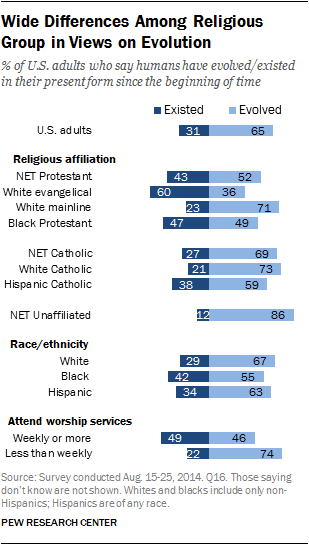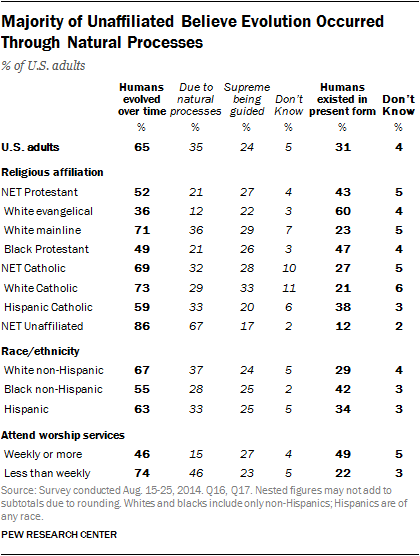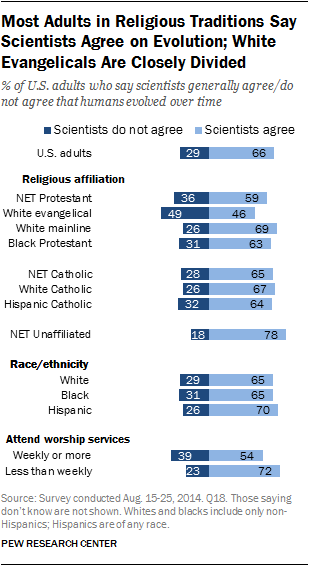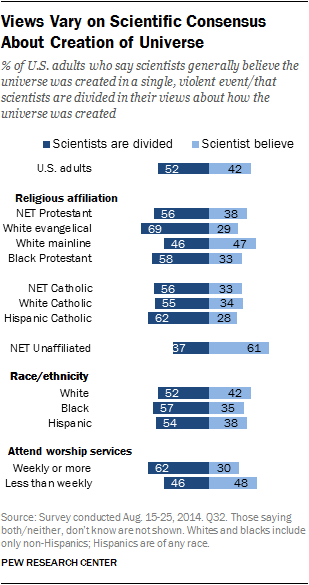There have long been religious divides over the theory of evolution through natural selection.3 The Pew Research Center survey shows wide differences among religious groups when it comes to beliefs about evolution, consistent with past surveys on this topic.

Overall, 65% of U.S. adults say “humans and other living things have evolved over time,” while 31% say humans and other living things have “existed in their present form since the beginning of time.”
A vast majority of religiously unaffiliated adults say humans and other living things have evolved over time (86%), as do most white Catholics (73%), white mainline Protestants (71%) and Hispanic Catholics (59%).
By contrast, just 36% of white evangelical Protestants say humans have evolved over time, while a 60% majority say humans have existed in their present form since the beginning of time. Black Protestants are closely divided on this topic – 47% say humans have existed since the beginning of time while 49% say humans have evolved over time.
Overall, 49% of religiously observant adults, that is, those who attend worship services at least weekly, say humans have existed in their current form since the beginning of time. By contrast, just 22% of those who attend church services less frequently say the same.
The Pew Research survey also asked a follow-up question about the processes believed to account for evolution. Thirty-five percent of adults (35%) say humans have evolved due to natural processes such as natural selection, while 24% say a supreme being guided the evolution of living things, and 5% of adults are unsure of their views about the processes behind evolution.

A clear majority of the religiously unaffiliated (67%) say humans have evolved due to natural processes such as natural selection. This is the only group among whom a majority holds this view.
Frequency of church attendance is also associated with adults’ views about evolution. Those who attend worship services regularly are closely divided over whether humans have evolved over time and just 15% of this group says humans have evolved due to natural processes. By comparison, 46% of those who attend services less regularly say humans evolved due to natural processes.
Multivariate regression analyses, shown in our related report, also find that religious tradition and religious service attendance have a strong role in predicting views about evolution. However, a number of other factors also have a significant influence on views about evolution including age, gender, education and political party and ideology.
There are different perceptions among Americans about whether there is scientific consensus about evolution

People’s beliefs about whether scientists tend to agree about evolution are strongly related to their views about evolution. In addition, there are differences among religious groups on this issue.
Two thirds (66%) of the general public say scientists generally agree that humans evolved over time, while 29% say scientists generally do not agree about this.
A majority of most major religious groups say scientists generally agree that humans have evolved, including 78% of the unaffiliated, 69% of white mainline Protestants and 65% of Catholics.
White evangelical Protestants are closely divided in their views about this issue; 46% say scientists generally agree that humans have evolved over time and 49% say scientists do not agree about this.
While black Protestants are closely divided in their personal views about evolution, 63% say scientists generally agree that humans have evolved over time.
Church attendance also is related to perceptions of scientific consensus; 72% of less-frequent churchgoers say scientists generally agree that humans have evolved, compared with 54% of more frequent churchgoers.
Multivariate logistic regression analyses predicting the view that scientists generally agree that humans have evolved over time found that those who attend church services at least weekly are less likely to believe that scientists generally agree about human evolution, but there was no statistically independent effect of religious tradition once other factors were controlled. Other significant predictors of the belief there is scientific consensus about human evolution include age, education, science knowledge and political ideology. See our related report for details.
There are disagreements over whether there is scientific consensus about the creation of the universe

In regards to perceived scientific consensus about the creation of the universe, 42% of U.S. adults say scientists generally agree the universe was created in a single, violent event, often called the “Big Bang,” while 52% say scientists are divided in their views about how the universe was created.
A 61% majority of religiously unaffiliated adults say scientists generally believe the universe was created in a single, violent event. By contrast, 69% of white evangelical Protestants and 62% of Hispanic Catholics hold the view that scientists are divided about the creation of the universe. White mainline Protestants are more evenly split on their perceptions of scientists’ views about the creation of the universe (47% say scientists generally agree and 46% say scientists are divided).
Those who attend church services regularly are more inclined to say scientists are divided about this issue. Three-in-ten (30%) of those who regularly attend church services say scientists generally agree that the universe was created in a single, violent event, while 62% say scientists are divided. Among those who attend church services less often, 48% say scientists generally agree about the creation of the universe.
A multivariate logistic regression analysis, shown in our related report, finds that other Christians (i.e., those who are Mormon or Orthodox Christian) are 35 percentage points less likely than the religiously unaffiliated to say scientists generally agree that the universe was created in a single, violent event. Other significant predictors of perceptions of scientific consensus include gender, education, science knowledge and political party. Frequency of worship service attendance does not significantly predict views on this issue after accounting for other factors.




